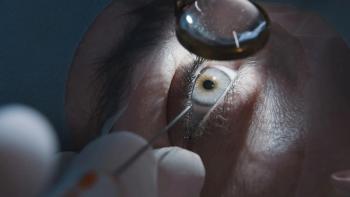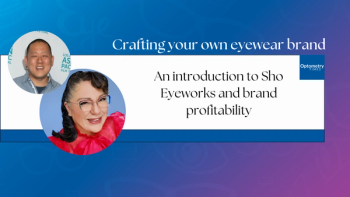
Prevent Blindness leads efforts to address the impact of vision loss and blindness on mental health
Prevent Blindness is embarking on a new strategy to raise awareness and provide education to patients and professionals to work together to address and improve the mental wellbeing for those with vision impairment.
Presentations and active discussions related to mental health and vision will be the focus of Prevent Blindness’ second day of the organization’s upcoming 2023 Focus on Eye Health Summit (July 13).
Julian Eaton, BSc, MSc, MBBS, MRCPsych, Mental Health Director, GBM Global, Assistant Professor, London School of hygiene and Tropical Medicine, will give the keynote presentation, “Innovative Mental Health Approaches." Eaton will address the importance of—and share actionable steps for—integrating mental health into the vision and eye health community.1,2
In the United States, adults with vision loss are 2-3 times more likely to experience depression compared to those with no vision loss.2
The Prevent Blindness Mental Health Task Force
In 2022, the Prevent Blindness Mental Health Task Force, which consisted of about 20 individuals—including eye care professionals, patients, peer counselors, psychologists, social workers and vision rehabilitation specialists—came together to discuss issues related to vision loss and mental health.2
Thanks to the work of this task force, the
The task force addressed key barriers2:
- Awareness: Mental health resources lack awareness and accessibility. Eye care providers (ECPs) may not be informed of the available mental health resources in their communities or have a referral network in place to agencies. ECPs may also not be aware of national emotional and social support resources available to patients living with eye diseases.
- Limited time: The time given for a clinic visit may not be enough time to address mental health concerns in patients who have or are at risk of vision loss.
- Shortage of trained providers: There is a national shortage of trained mental health professionals (such as licensed psychologists, psychiatrists, social workers, and other counselors), especially those trained in caring for or counseling those with vision loss or blindness.
- Stigma: There is general stigma around mental illness at the individual, provider, and public levels, which can cause individuals to not seek help or referrals to mental health providers.
- Lack of referrals: There are insufficient referrals to vision rehabilitation. This may be due to reluctance from either the ECP or the patient, such as not accepting that medical treatment is no longer helpful, and that vision rehabilitation would be equally beneficial—even while during the medical treatment phase—as vision loss is experienced.
Furthermore, the task force compiled key takeaways on the intersection of vision loss and mental health2:
- Change of loss of identity: For those who develop vision loss or blindness as adults, they might feel a shift in their identify if they find themselves unable to do the things they once did, whether that be in the same way or not at all.
- Loss of independence: Individuals living with vision loss and blindness can experience acute depression and anxiety, as a reflection of losing independence and adjusting to their new life circumstances.
- Emotions, tracking, and recall: When a new diagnosis is made, patients might not grasp all the information during the office visit. Feelings of shock, fear, loss, confusion, etc. can cloud the information presented, and it’s imperative that patients are given extra time to engage in both emotional and cognitive processing.
- Grief and coping: While gradual vision loss is different than a possible life-threatening condition, patients will still benefit from being asked about how they’re coping and what supports they have in place.
The task force illustrated how ECPs can ask questions that communicate empathy, including:
- “I imagine it is hard adjusting to vision loss. How are you holding up?” This statement helps to normalize the grief and loss process, while showing that you care.
- “Would you like to talk to someone about how you’re feeling?” Asking a question in this way can help you navigate the mental health stigma so many individuals have internalized.
- “Tell me about how you have previously coped with difficult situations.” This allows patients the opportunity to be reminded of the skills already in their toolbelt to manage challenging situations and navigate complex emotions.
Integrating mental wellness with vision
A top priority of vision health organizations should be supporting mental wellness in patients with vision loss and blindness, with an emphasis on the continuum of patient care from promoting research, to giving a diagnosis, in the provision of treatment, and promoting functionality and vision rehabilitation.2 To make this happen, opportunities for advocacy and efforts to integrate mental wellness with vision were identified by the Mental Health Task Force. These identified efforts for process improvement and advocacy fall into four categories: vision rehabilitation; resource development and dissemination; training for providers (eye care, primary care, and mental health); and developing an integrated eye care model.2
Awareness of vision rehabilitation services: This effort aims to increase awareness and referrals among providers and patients regarding vision rehabilitation services.2
Resource development and dissemination: This effort focuses on increasing availability of mental health resources—supported by research and public health initiatives—to those living with vision loss and blindness. Additionally, this effort aims to facilitate resource-sharing amongst providers and other organizations.2
Training for eye care, primary care, and mental health providers: This effort emphasizes the importance of various trainings amongst eye care, primary care, and mental health care providers. Trainings include the importance of empathetic communication from eye care providers, teaching them how to check-in with their patients on their mental health and asking how they are coping and what their support system might look like. Understanding the grief process unique to this patient population is important for primary care and eye care providers. And lastly, this effort includes increased training for mental health providers to understand the “patient journey” of those living with vision loss or blindness and how to best provide psychosocial and relational transition care.2
Resources provided by the Prevent Blindness Mental Health Task Force
Living Well With Low Vision ASPECT Patient Engagement Program VisionServe Alliance Vision Aware Eye2Eye National Suicide Prevention Lifeline : 988OIB-TAC at Mississippi State University Hadley Institute for online courses American Printing House for the Blind American Foundation for the Blind American Council of the Blind National Federation of the Blind National Council of State Agencies for the Blind
References
1. Prevent Blindness Launches Multiple Efforts to Provide Education and Resources on the Effects of Vision Loss and Blindness on Mental Health - Prevent Blindness. Published June 7, 2023. Accessed June 7, 2023. https://preventblindness.org/prevent-blindness-mental-wellness-vision-loss/
2. Vision loss and Mental Health: Key takeaways from an interprofessional ... Vision Loss and Mental Health: Key Takeaways from an Interprofessional Task Force. Accessed June 7, 2023. https://preventblindness.org/wp-content/uploads/2023/05/Mental-Health-Issue-BriefF.pdf.
Newsletter
Want more insights like this? Subscribe to Optometry Times and get clinical pearls and practice tips delivered straight to your inbox.





